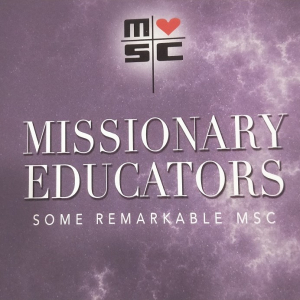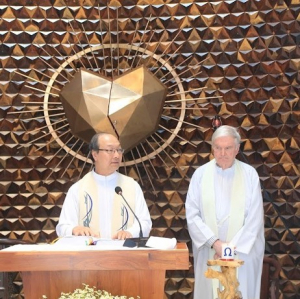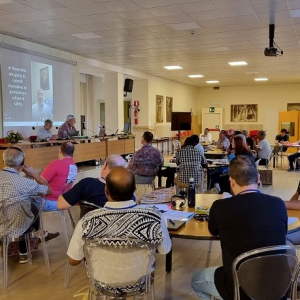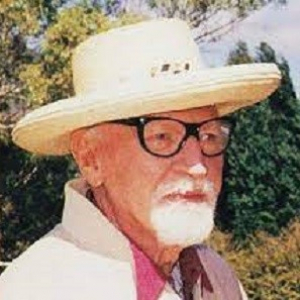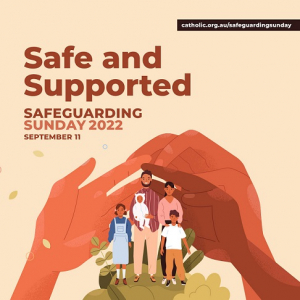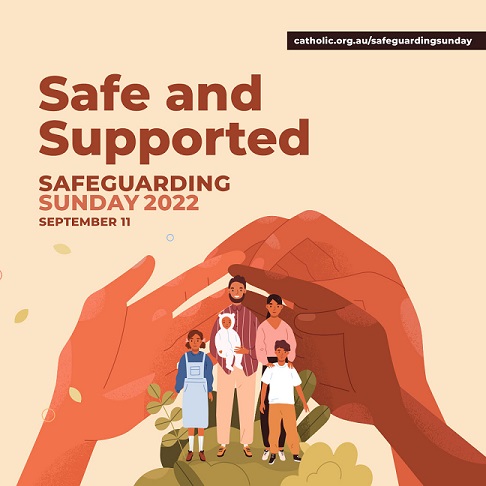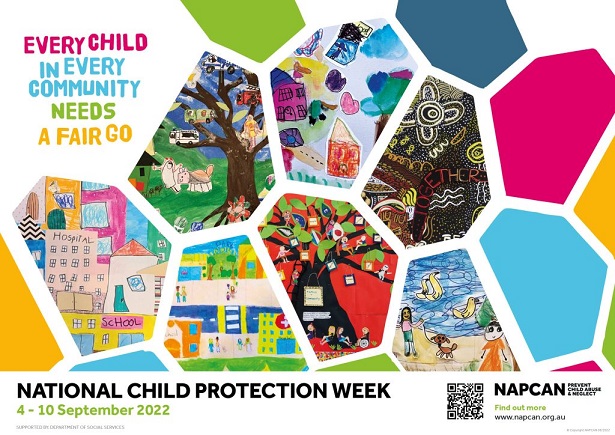Peter MALONE
Missionary Educators, Some Remarkable MSC. Jim Littleton's final book. Congratulations
Missionary Educators, Some Remarkable MSC - End of an era, Jim Littleton's final book. Congratulations.

The last of Jim Littleton’s monographs (28 in total), and the 9th in the series, Some Remarkable MSC (58 in all)

Here there are 8: Fr J.J. McMahon, Fr Gerald Kelly, Fr John McGhee, Br Bob Lysaught, Fr Kevin Murphy, Fr Harold Baker, Fr Jim Fallon, Br Ken Clancy.

Jim with Harold Baker, one of the Remarkable MSC

After We Fell
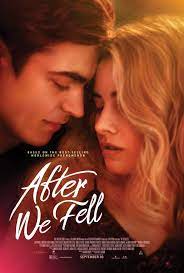
AFTER WE FELL
US, 2021, 98 minutes, Colour.
Josephine Langford, Hero Fiennes Tiffin, Louise Lombard, Chance Perdomo, Rob Estes, Arielle Kebbel, Stephen Moyer, Mira Sorvino.
Directed by Castile Landon.
This is the third film in the series based on novels by Anna Todd. It was preceded by After and then After We Collided. This present film was made in Bulgaria in 2020, back to back with a further sequel, After Ever Happy. These two films were directed by Castile Landon who also directed a fifth in the series, not based on a novel by Anna Todd, awaiting a title for the time of release.
This film takes up immediately where After We Collided finished. The focus is on the relationship between Tessa (Josephine Langford) and Hardin (Hero Fiennes Tiffin). By this stage of the films, the audience knows whether they warm to these characters or not – and each of them, good-looking in their way, of course, is a difficult character, Tessa ambitious in her work, Hardin sullen and brooding.
This film received very negative reviews – with which this reviewer concurs. It has some appeal to Young Adults, perhaps, but not for older audiences even if there is a focus on Tessa’s father and his coming to live with the couple and causing difficulties, and Hardin is in a difficult relationship with his stepfather.
So, there are the relationship difficulties, compounded by interactions with their friends – and suspicions. There are workplace issues. There are personal issues, coming to a head with Hardin deciding to go to London for a step-parent’s wedding and wanting Tessa to go with him.
Since they were making the next film at the same time, perhaps this story is just repetition and a filler.
Thirteen Lives
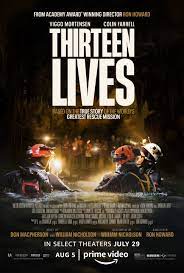
THIRTEEN LIVES
US, 2022, 147 minutes, Colour.
Viggo Mortensen, Colin Farrell, Joel Edgerton, Tom Bateman, Paul Gleeson,Teeradon Supapunpinyo.
Directed by Ron Howard.
For audiences who remember the events in Thailand, June-July 2018, the football team of young boys and their coach venturing into caves, the weather changing, downpour, and their being trapped, this is a strong dramatisation. Previous to the release of this film, there had been an Oscar-nominated documentary, The Rescue. While some viewers of each film want to promote one as better than the other, a more reasonable approach would be to accept each film on its merits – and, this may depend on the order in which the films are seen. This reviewer saw The Rescue first and appreciated the documentary tone, the reconstruction of the swimming and the rescue, the introduction to the actual characters and their comments. This provided a very useful background to appreciating the characters, the situations, the difficulties in Thirteen Lives.
The screenplay was written by British writer, William Nicholson, his credits range from his C.S.Lewis drama, Shadowlands, to Gladiator. The film was directed by Ron Howard, former child actor, director of a wide range of entertaining films, fiction and striking documentaries for more than forty years. He tackled an extraordinarily challenging and dangerous situation, in space, with Apollo 13.
Any review must give credit to the technical side of this film. There is a reconstruction of the cave, the audience being well aware of rocks, stalactites, narrow tunnels to swim through with oxygen equipment. In fact, the production design enhances the realism of the story and the storytelling. It is one of those films where the audience feels that it is there, not just watching what is going on, but sharing the experience with the divers, close-ups of the tunnels, the claustrophobic effect, the dangers of flowing currents, the setting up of the rope guides to continue the search and then the rescue.
The filmmakers have opted for using Thai language with the Thai characters amongst themselves, meaning that an English-speaking audience can be satisfied when the characters speak English but also share the fact that this action takes place in a country with which they are not particularly familiar, where people use a different language, with a different customs (courtesy being important, and an emphasis on religious belief and practice, prayer, meditation, Buddhist monks, offerings).
The film also shows the local activity: the gathering of the parents and their anxiety and fears, the invasion of the media, the setting up of stalls for feeding all those involved. And there are the Thai Navy Seals, limited in their abilities, and a death. There is the Governor and the decisions he must make, some hostility between him and the Captain in charge.
Two divers are brought in from the United Kingdom, Rick Stanton and John Volanthen (and their characters are created well by Viggo Mortensen and Colin Farrell). Despite some local wariness, they eventually find the boys, alive, surviving without food, in the dark, meditating and encouraging each other.
For audiences who do not know the outcome, the suspense must be very telling. Perhaps it is something of a relief for those who do know the outcome that they know that despite all the suspense, all the fears, all the uncertainties, that the mission was a success.
While the boys are found, there is still the difficulty of getting them out, and a presumption that they would die. This is where Australian doctor, Dr Richard Harris (Joel Edgerton) comes in, where he and an associate (who is not made a character in the film) worked out the medication and anaesthetics required to subdue the boys to enable them to hours of being rescued, unconscious.
Tribute is also made to the locals who used limited means, even splitting bamboo to make channels, to pump out the water and for it to go over local farms.
A film which has received almost unanimous acclaim from critics and public alike.
- Audience knowledge of this event and its outcome? 2018? World interest? Seventeen countries involved, 5000 helping? The documentary, The Rescue?
- Filmed in Thailand and in Queensland? The authentic locations of the countryside, and mountains, the cave? The musical score?
- The structure of the film, the psychological development, the introduction to the boys playing, with the coach, eagerness, the possible birthday party, going to the cave, venturing in? Then the transfer of attention to the search, the anxious parents? Leaving the boys there, the uncertainty? The numbering of the days and dates? The local attempts, the international attempts, finding the boys, government decisions, the dangers, Dr Harris and the solution? The execution of the rescue for saving the boys? The results?
- Audience sympathy for the boys, their cheerfulness, playing the game, the coach, going into the cave, the excitement?
- The weather, the consistent rain, the flooding of the cave, unsettling the rocks and their falling, gushes? The locals, the young man negotiating, the farmers, pumping out the water, flooding the fields, the devices, the holes, pumps, the bamboo for flowing out the water? The massive enterprise? Success?
- The parents, gathering, anxieties? The feeling amongst themselves? The growing number gathering outside the cave, the media and the cameras? The setting up of shops, selling the food? The Thai Navy Seals, the captain, decisions, the governor, his assistant, his tenure of office, having to make decisions? The minister later coming and authorising the rescue? The men going in, finding it difficult? The British adviser, the suggestion of inviting the British divers, Rick and John?
- Rick, living alone, his reputation, personality? Contacting John, at home, the family, his son? Coming to Thailand, passport difficulties? Their observing? The captain wary of them? The governor?
- Audience response to the dangers of swimming in the caves, the reconstruction of the caves, the stalactites, the narrow tunnels, oxygen, the breathing apparatus? The map, the distances? The visuals of the men swimming, difficulties, taking such a long time, crawling through the narrow spaces? Eventual progress? The days passing?
- Rick, his pessimism about the boy’s being alive, John more optimistic? The joy in finding the boys, taking the video, coming out, the authorities seeing the video, the families? The return, the boys, their morale, meditating, hungry, in the dark, the relief with food? Getting them to write notes for their parents?
- The religious background Thailand, the statue of the sleeping princess, the image of the mountain, the Buddhist monks, processions, gifts and offerings? The people, the religious background, Thai courtesy, respectful meetings, the mother and the gift and the prayer, to John, in Rick’s pocket (and his discovering it on return home)?
- The difficulties for the locals, the local who panicked, his death?
- The idea for Dr Harris, his arrival, wary about the idea, the only possible idea, the expectations of the boys would be dead?
- The planning, the anaesthetics, the medication, the masks, dangers for saliva and drowning? Testing and training?
- The International personnel, the local personnel? The background of Charles and Jason, their experience, joining the group?
- The drama and suspense of the rescue, over the days, the procedures, getting the boys out, the news not getting out, the helicopters to hospital? Dr Harris and his talk about the World Cup and the injections? Each of the men, the procedure getting the boys out? Charles at the end, losing the rope, stranded, Rick finding him, urging him to follow Dr Harris’s advice, everyone getting out?
- The response of the governor, the press conference, the people’s reaction? The news of Dr Harris’s father dying?
- The return home, achievement? The boys, hospital, the parents coming, the birthday party?
- The final statistics, a world achievement?
Coherence
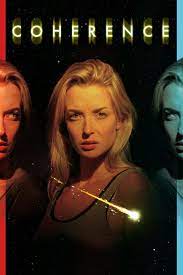
COHERENCE
US, 2013, 89 minutes, Colour.
Emily Baldoni, Maury Sterling, Nicholas Brandon, Lorena Scafaria, Elizabeth Graycen, Hugo Armstrong, Alex Manugian, Lauren Maher.
Directed by James Ward Byrkitt.
A film for more specialist audience. It is small budget, was filmed over five nights, is largely improvised, each of the members of the cast being given some background to the character, not knowing details of the other characters.
The situation is an evening, a gathering of eight, the audience having to work hard initially to identify each of the characters, their relationship to each other, present relationships, past relationships, as well as professions. The occasion is Miller’s Comet passing through the skies.
For audiences who enjoyed improvisation, for performers who are skilled in creating dialogue and situations, responding, interactions, there is much of interest.
And there are complications with the evening, especially the power going out. And, some of the group going outside to see what was happening. There are some scenes outside, especially concerning a car outside the building towards the end of the film.
The screenplay then turns surreal, the suggestion of alternate universe, alternate personifications of each character. They puzzle, they discuss, one sleeps, ping-pong equipment is brought back into the house, different numbers on the back of the boxes, the puzzle of identifying which blocks box belong to which character.
And, there are problems with identification, a brother of one of the characters, and the interactions between the two universes. This involves going outside, the characters who go outside, what they discover, a parallel dining set up, the car, sleeping in the car, who wakes up…
In the morning, everything seems normal – but, the audience is left with a character discovering the alternate version of herself.
And, the title, enigmatically, is Coherence.
Lacci/ The Ties
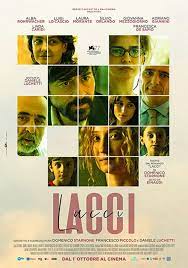
LACCI/THE TIES
Italy, 2020, 100 minutes, Colour.
Alba Rohrwacher, Luigi lo Cascio, Laura Morandi, Silvio Orlando, Giovanna Mezzogiorno, Adriano Giannini, Linda Caridi.
Directed by Daniel Lucchetti.
Something of a different take on the exploration of a marriage and its breakdown. The title, Lacci/ The Ties, his provocative, especially since the central couple are not married, have an arranged commitment – which breaks down.
The first part of the film is set in Naples around 1980, the cheerful beginning, a children’s gathering and dancing, mother, father, boy, girl, all returning happily home, making sandwiches, sitting together watching the television at a documentary. And the father, who in fact is a reader on radio, reading the children a bedtime story. And, that is the last peaceful scene.
There is tension in the kitchen and the father, Aldo (Luigi lo Cascio) blurts out to Vanda (Alba Rohrwacher) that he is in a relationship – in fact, with one of the staff at the radio station in Rome.
We watch the reactions, somewhat impassive response of Aldo, his packing and leaving, and the anger and self-absorption of funder, as well is the effect on the two children, and this continues over some time, even to a fight between Aldo and Vanda in the streets, the children in the car watching. And Vanda visiting the radio station and icily staring at the other woman, Lydia.
Then, a surprise. The action advances thirty years, an older Aldo (Silvio Orlando) and Vanda (Laura Morante) together in old age, which keeps is wondering about the nature of the relationship and what has happened over the decades. There is tension. There is a situation where Aldo gives a woman delivering some goods more money than she deserved, then their going on a holiday together. But, on their return, they find the apartment completely trashed. The young woman is an obvious suspect.
During these scenes there are many returns to the past, taking the action on a bit further in the strained relationship then.
But, it is at this time that we see the adult children, their discussions about their lives, the reaction to their parents, the fact that they are to look after the apartment while their parents on holiday, the going to the apartment and, before we see it happen, we realise that it is they who have trashed everything.
And, that is where we are left – to our own reactions, to our reflections.
- The title, commitments, bonds, men and women, marriage, parenting?
- An Italian drama, universal? The atmosphere of Naples in the 1980s? The atmosphere of Rome? Moving forward to the 21st century, the mansion, interiors and destruction? The musical score?
- Setting the tone, the celebration with the children, the line dance, the family going home, the meal, sandwiches, watching the television together? The father reading the story, the children going to sleep?
- The tensions, the fact the couple were not married, the commitment, tensions at home, the 12 years, the children, Aldo confessing the relationship, Vanda’s reaction? Ousting him? His relationship with Lydia? At the radio station, his readings, literary comments? Lydia part of the technical staff? Vanda and her visit, staring at Lydia?
- Moving forward, Vanda looking after the children, the time with their father, his coming home, Vanda wanting him to come back and support the family? The children in their time with him, with his parents, his returning them early?
- Audience response to Aldo, his behaviour, betrayal, with the children, fickle? Audience response to Vanda, her past, parenting, love for Aldo, yet the focus on herself?
- Vanda with the children in the car, watching Lydia and told in the street, the fights? The buildup to a final separation?
- The film fast forwarding to the 21st century, the couple older, living together for decades, yet his contact with Lydia, the secret photos, the question of funder and relationships? The comfortable home, going on holidays, the importance of the cat (and the irony of his nickname as Beast with the Latin dictionary and derogatory meanings)? Packing up, going, the holiday, returning, the destruction in the house?
- The incident of Aldo, the woman with the delivery, the wrong price, his tip, seeing her afterwards, suspicions? The return to the house, the photography? Audience suspicions?
- The film returning to the past and intercutting with the future, the children growing up, Anna and her being surly, Sandro and his father?
- The scenes with Anna and Sandro, the relationship with their parents, Sandro and his marriages, Anna not marrying, to look after the house during the holiday break, the cat? The going to the house, the discussions, memories of the past, their parents, judgement of their parents, the reaction, starting to throw the papers, then proceeding to trash the house completely?
- And leaving this with the audience?
Murder at the Vicarage
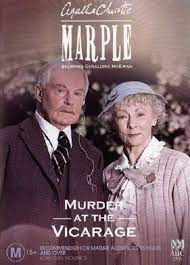
MURDER AT THE VICARAGE
UK, 2004, 94 minutes, Colour.
Geraldine McEwan, Stephen Tompkinson, Derek Jacobi, Robert Powell, Jane Asher, Janet McTeer, Jason Flemyng, Herbert Lom, Miriam Margoyles, Rachael Stirling, Julian Morris, Angela Pleasance, Christina Cole, Emily Bruni, Ruth Sheen.
Directed by Charlie Palmer.
Agatha Christie novels on screen are always popular. And the Miss Marple television films with the three actresses also made their mark. Here is Geraldine McEwan, a sweet and nosy Miss Marple.
As with all these television films, the supporting cast is outstanding, drawing on an enormous range of British character actors. Derek Jacoby enjoys himself as a loud and bullying Colonel and local magistrate – and the target of dislike, even to murder. The film also features Robert Powell as the local doctor, Jane Asher is the former wife of the Colonel, Janet McTeer as his wife, Jason Flemyng as a visiting artist, Herbert Lom as an investigator, Miriam Margulies and Angela presence as gossips in the town, Rachael Stirling and Tim McInerney as the vicar and his wife and Stephen Tompkinson moving from DC Banks to the local detective investigator.
The early part of the film establishes all the characters and the atmosphere of the village. It also provides a basis for a great number of suspects when the Colonel is finally killed.
Once again, the murder set up is ingenious but Miss Marple, along with the detective, is able to work out what went on and make accusations.
Touch of the spoiler – the two who commit the murder are very sympathetic, Miss Marple even liking them, which means that we, the audience, also like them, so that is very disappointing and dismaying to find that they are guilty.
- The popularity of Agatha Christie stories? Miss Marple? The three actresses?
- The location, the village, the church and vicarage, mansions? The period, the 1950s, costumes and decor? The musical score?
- The opening, St Mary Mead, the vicar, his wife and devotion? The congregation? Introducing Miss Marple? The atmosphere of the village, the older women, meetings, gossip? The response to Colonel Protheroe?
- Colonel Protheroe, the history of the war, his role as a magistrate, his daughter, his relationship with his wife, his bullying manner, shouting, the case with the poacher and the heavy sentence? The community dislike of him? His going to the vicarage, found dead?
- The wide range of suspects? Those who disliked him? His wife, the later marriage, the relationship with the daughter? The daughter, her being painted, provocative, her father’s disapproval? Lawrence Redding, popular, painting the vicar’s wife, access to the house?
- The various women, their gossiping, the sending of the nasty letter?
- The doctor, his place in the village, reputable?
- The presence of the professor, his assistant, the alleged research, the revelation of the truth, to unmask the Colonel?
- The court case, the family of the accused, his being sent to prison, response?
- The time of the murder, alibis? The colonel’s wife and Lawrence Redding, Miss Marple seeing them? The vicar’s wife, the train journey, its being cancelled?
- Detective Inspector Slack, his work, collaboration with Miss Marple, the very serious, interrogations?
- The buildup to the solution, the vicar’s wife pregnant and going to check?
- Colonel’s daughter, the absent mother, her return to the village, creating a scene, the revelation of who she was, the reunion with her daughter?
- The revelation about the visiting professor, his going for a walk, his search, alibi?
- Miss Marple liking Lawrence and Anna Protheroe (and audience sympathy for them)? The relief that they had an alibi? Miss Marple, her observation about and is behaviour and walk, suspicions, the gun, the shot, the distraction?
- The solution and expose? A satisfactory Miss Marple story and investigation?
Uncle Bob’s first letter from Vietnam in three years
Uncle Bob’s first letter from Vietnam in three years

Dear Friends,
Greetings from Saigon, Ho Chi Minh City.
It has been a couple of years since I last wrote a Vietnam News Letter...as I last left here in December 2019, and because of Covid around the world, I did not return until recently. But now I am well and truly ensconced in my eagle’s nest atop a high rise.
We MSC have been here 19 years, and I have come here most years...and certainly there have been many changes, but some things are still the same e.g. traffic is worse but pedestrian crossings are still a waste of paint and footpaths are still high risk for pedestrians too! Saigon has about 10 million people, and probably the same number of bikes! High rise apartments everywhere, but no one stares at foreigners anymore... I seem to be taken for granted despite me being Uncle dep lao (not bad for an old man!!!)
Just sending you a quick list of some things that have been happening in the MSC world here: Provincial was here for a month and amongst many other things visited the families of each student... a huge but rewarding exercise; four new first vows guys; poignant farewell on the weekend for Thoi who has been both our formator and Superior for most of our time here...the end of an era;
academic year has started for all the students; preparations for final vows, ongoing formation for those in ministry; recollection days; commitment ceremony for young Lay MSC...there have been some wonderful experiences together, especially now that Covid seems to be better under control here than in Oz, despite the fact that they had horrendous lockdowns in the past, and that there are nearly 100 million living in Vietnam, in an area about 1.5 times the size of Victoria. I’m told that Oz is 23 times the size of Vietnam!
Vietnam itself has been busy with Independence day holidays, millions of children returning to school, moon cakes, mid Autumn festival etc etc...wet season with min temps of 25 and max 35, plus storms...not much chance of boredom here.
Take care down there. Spare us a prayer every now and then. I will try to send some photos, and you will see the hopeful, positive spirit, so obvious here..
Lots of love. God bless. Uncle Bob
COMMITMENT CEREMONY OF YOUNG LAY MSC
On Sunday 11th September, a group of 14 “young” MSC lay in Vietnam renewed their commitment.
They are called young lay to distinguish them from some of the other groups of MSC lay in Vietnam. True to the hopes of Fr Jules Chevalier, MSC lay have been part of the MSC outreach in Vietnam since our foundation there, nearly 20 years ago.
The ceremony for 8 women, including one on zoom from Australia{!}, and 6 men, was held in the beautiful new chapel of the MSC scholasticate, before a large crowd of professed MSC priests, brothers and sisters, seminarians, postulants, families and visitors.
Fr Minh was main celebrant, Hoang gave a stirring homily, and Uncle Bob blessed the emblems with the help of Danh, and gave to each one, whilst students Loc and Thanh Vu kept us on track.
The mood was one of great happiness, dignity, humour, and celebration, with some very moving moments and wonderful singing.
After the ceremonies in the chapel there was a typical Vietnamese great feast and celebration.
WE are so grateful for the blessings God has given us here in Vietnam, as we all stive our best to be on earth the heart of God as religious and lay. A BEAUTIFUL FAMILY.
MSC International Safeguarding Conference, Rome
MSC International Safeguarding Conference, Rome
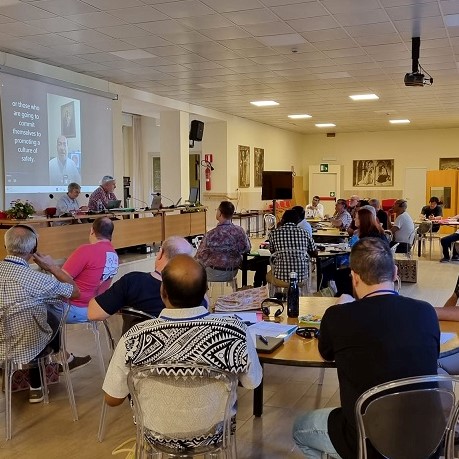
Peter Hendriks, representing Australia with Meta Jackman writes:
Monday is the last full day of the MSC Safeguarding Delegates Conference.
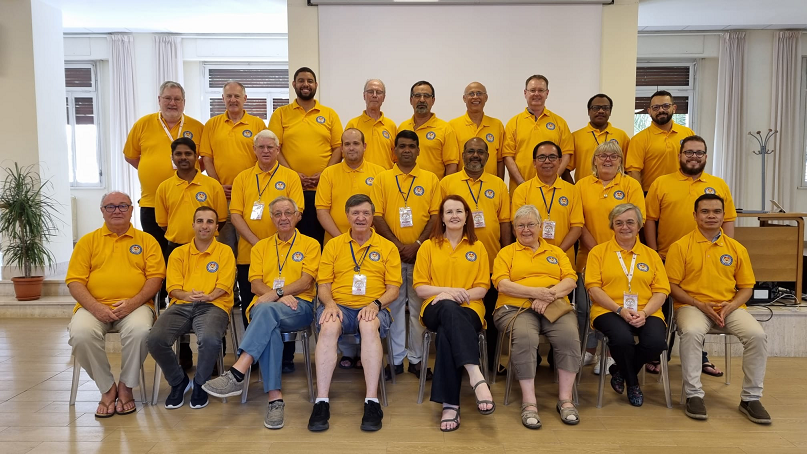
It has been a very full conference, and everyone has worked hard.
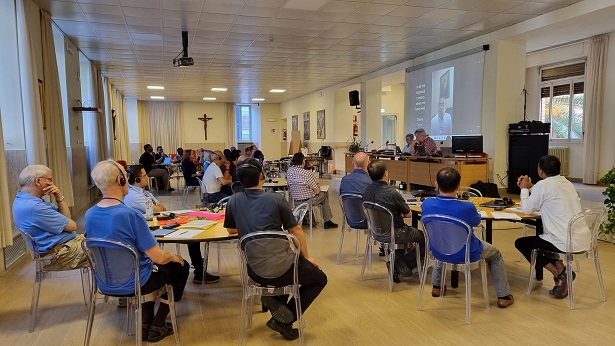
The delegates heard from three victims of abuse and one secondary victim
Sylvester PNG and Tina Campbell
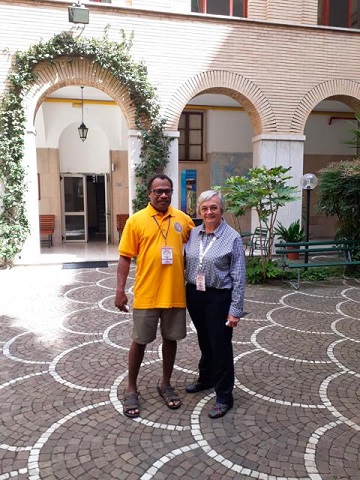
Dan Geary FMS and Tina Campbell, Scotland with Tim
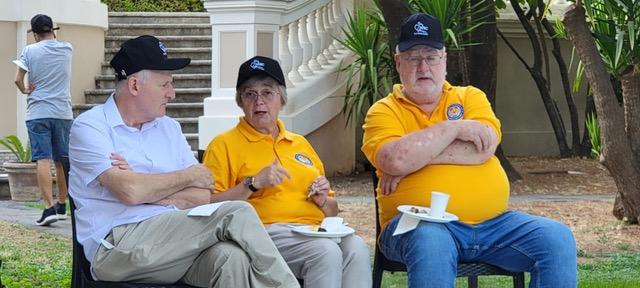
We had a visit from Fr Andrew Small OMI, the deputy for the Pontifical Council of the Protection of Minors (PCPM).
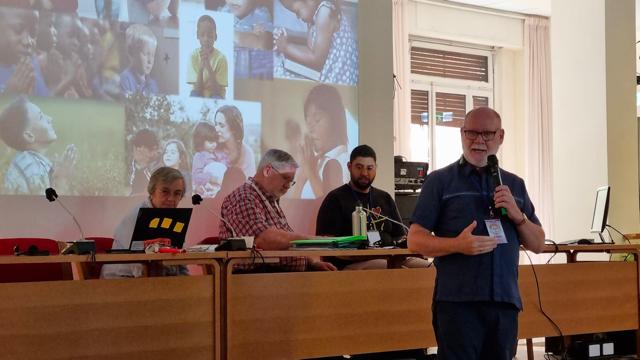
Chris Chaplin leads prayer
Other areas covered were:
- Care, Support and the accompaniment of victims
- Care, Support and management of the accused.
- Responding to allegations according to civil and church law.
- Sacrament of Reconciliation
- The internet and social media
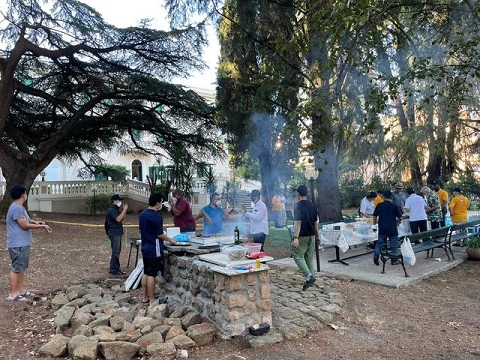
There are 37 attendees: MSC, lay, guests and facilitators.
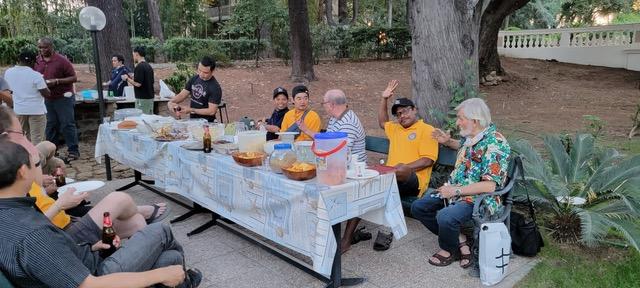
It was my first International MSC Conference, and it was a privilege and energising to meet other MSC from so many different countries.
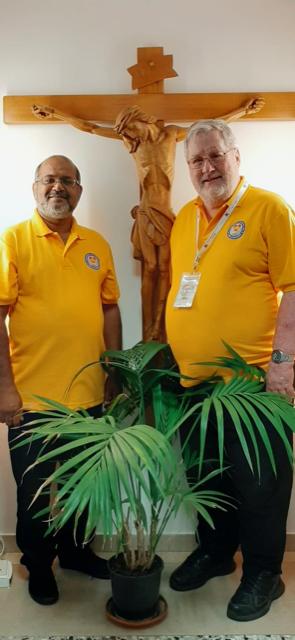
Simon Mani and Tim
Meta Jackman found it very helpful to make contacts with MSC involved in Safeguarding in various provinces. She and Mary Tallon (the Irish Safeguarding Officer) were the only two lay people who were participants.
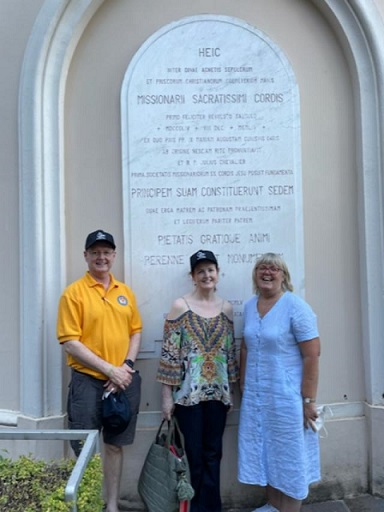
PS. "Roberto (Italy), Peter. We only communicated via google translate, and he laughed at all my jokes! (or at my poor translation"). (Peter was obviously missing his jokes/cartoons file and sent this instead.
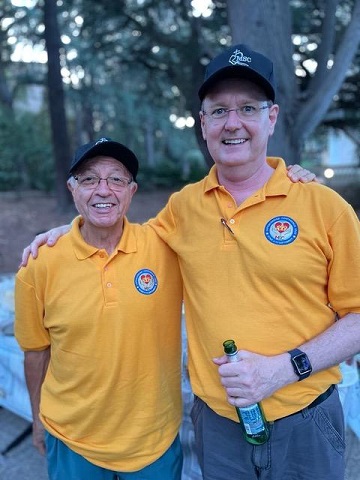
Thanks to Peter and Anne-Marie Snelling for sending the text and photos.
A Monday Wikipedia search: entry, Frank Flynn MSC
A Monday Wikipedia search: entry, Frank Flynn MSC
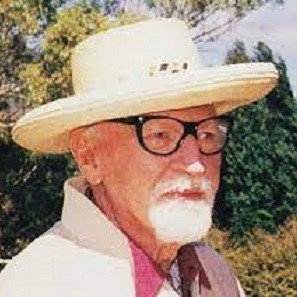
Not every MSC has a Wikipedia entry, but here is one – in memory of Frank Flynn. His contribution to the Province heritage.
Francis Flynn AC FRACO (6 December 1906, Sydney – 29 July 2000) was a Northern Territory-based Australian medical doctor (ophthalmologist), author and missionary priest. He is notable for his contributions to religion, medicine and Aboriginal welfare.
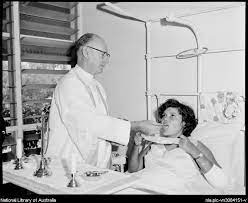
He was born on 6 December 1906 and educated in Sydney, receiving MB BS with 1st class honours in 1930. In 1931 he sailed to England and in 1931 and 1933–1934 studied and worked at the Royal Ophthalmic Hospital (Moorfields) in London. Prior to World War II he had made several important contributions to the study of eye disease, including the introduction of a new drug which he named Mydriciane, and the design and patenting of a machine used in operating on detached retinas.
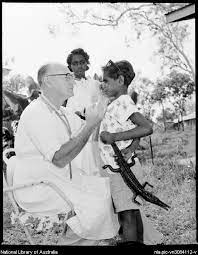
He returned to Sydney in 1934 and joined the Missionaries of the Sacred Heart (Missionnaires du Sacré-Coeur) (MSC) in December 1935. He was ordained a priest in March 1942 and, with advice from the pioneering missionary Bishop Gsell, was sent to the Northern Territory. From 1942 to 1945 worked with Army Hospitals. From 1946 to 1968 he was consulting ophthalmologist to the Northern Territory Department of Health. His activity as a consulting ophthalmologist to the Northern Territory Trachoma and Eye Health Programme continued until 1992.
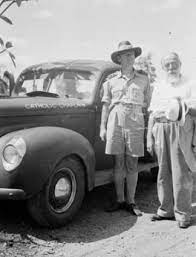
From 1944 to 1946 he studied anthropology with Professor Elkin and gained Diploma of Anthropology at University of Sydney with the intention of gaining "a wider knowledge and appreciation of Aboriginal culture and genealogy, and academic methods of field research".
As early as 1942 maybe he had identified and officially reported that there was an appallingly high level of trachoma amongst the Australian Aboriginal people in the Northern Territory. In 1957 he made a full report on his findings in The Medical Journal of Australia.[8] In 1976 an official Australian-wide survey on trachoma amongst Australian Aboriginals was started under the direction of Professor Fred Hollows, who was mentored by Flynn.
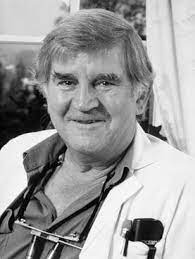
Fred Hollows
In 1967 Flynn was transferred to Port Moresby as Administrator of the Cathedral and Director of Catholic Health Services in Papua New Guinea. In 1970 the Medical Faculty at the University of Papua New Guinea was founded.
He returned to Darwin in 1977 and was still active in the 1990s; for example, in 1995 he worked with Army medical eye service units which travelled to isolated Aboriginal communities in the Northern Territory.
Recognition
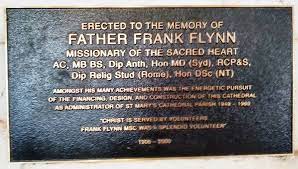
At one stage his full list of titles read: MSC, AC, MB, BS (Syd), DOMS RCP&S (Eng), Dip Relig Studies (Rome), Dip Anthrop (Syd), FACTM (Townsville), MD (hc) (Syd), DSc (hc) (NTC), which led to a young friend writing, "Mum is worried about the number of letters after your name".
- 1969 - appointed a Foundation Fellow of the Australian College of Ophthalmologists.
- 1979 - appointed Officer of the Order of Australia (AO).
- 1981 - awarded Doctorate of Medicine Honoris Causa University of Sydney.
- 1985 - elected Foundation Member International Society of Dakryology.
- 1990 - conferred with the Papal Apostolic Diploma, together with the Cross Pro Ecclesia et Pontifice.
- 1993 - appointed Companion of the Order of Australia (AC).
- 1993 - awarded Honorary Doctor of Science, NTC
- 1994 - appointed Fellow of the Australasian College of Tropical Medicine.
- 1996 - appointed an Honorary Life Member of the Royal Australian and New Zealand College of Ophthalmologists.
Publications
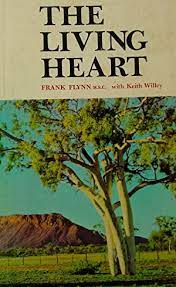
- 1947 Distant Horizons
- 1963 Northern Gateway
- 1964 The Living Heart (with Keith Willey)
- 1968 Northern Frontiers (with Keith Willey)
Safeguarding Sunday
|
The National Catholic Safeguarding Standards (NCSS) create a framework for Catholic entities to promote the safety of children and adults at risk. They outline the policies and aIctivities that will prevent, respond to, and support reporting of concerns regarding child abuse. The Standards work together to ensure that every entity, ministry and organisation across the Catholic Church places the safety of children and adults at risk at the core of how they plan, think and act.

The Missionaries of the Sacred Heart (MSC) Professional Standards & Safeguarding Office is located at the MSC Provincialate for the Australian Province, Treand House, Coogee, NSW.
